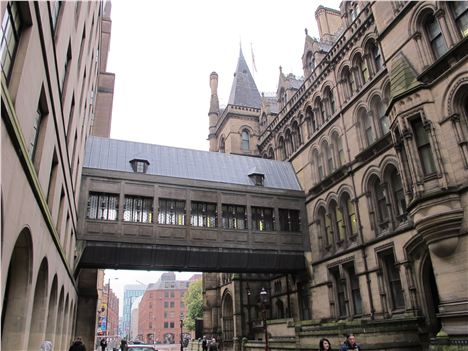MANCHESTER City Council have today announced that up to 600 staff could be axed as they face-up to another round of budget cuts.
“This is a much longer budget-setting process than usual and we want to be open and transparent about the extremely tough position we are in and some of the stark choices we face."
Following £250m of cuts between 2011 and 2015, the City council are now facing another £59m of cuts in 2015/16, potentially rising to £91m in 2016/17 following deep reductions in central government funding.
In the last financial settlement, Manchester was dealt the largest percentage cut in government funding of any of England's core cities outside of London, these include: Birmingham, Bristol, Liverpool, Newcastle, Nottingham and Sheffield.
Between 2010/11 and 2015/16, Manchester has experienced the eighth biggest spending cut per resident of all councils in England - a reduction of £311.94 per head. This is despite Manchester having the fourth highest level of deprivation in the country.
In order to make savings, the City council estimates that up to 600 further full-time jobs may be lost, on top of nearly 3,000 postions already axed in the last four years.
However, the council say they are aiming to avoid compulsory redundancies through a programme of voluntary severance and voluntary early retirement.
Options on how to cut spending will be going before council scrutiny committees from Monday 17 November, the reports will then be considered by the council executive on Wednesday 26 November before public consultation.
Following all considerations, a draft budget will be produced in January 2015 with final decisions on budget made in March 2015.
Sir Richard Leese, leader of Manchester City Council, said: “This is a much longer budget-setting process than usual and we want to be open and transparent about the extremely tough position we are in and some of the stark choices we face.
“Let us be clear. What we are announcing today are options, not proposals. We will listen carefully to people’s views in the months ahead. If they have viable alternative options for cuts we will give them serious consideration because, frankly, we don’t much like the options we have.
“We have to set a balanced budget and the severity of the cuts to our central government funding on top of previous cuts make that deeply challenging, and not something that can be achieved painlessly.”
Below are the council's list of proposed cuts in their words:
The Children’s and Families directorate accounts for the largest part (54 per cent) of the current Council budget. As a result, it accounts for the largest proportion of the suggested savings, some £54.153m.
But the Council is committed to ensuring that the most vulnerable people are protected and that children’s safeguarding services are improved.
In the longer term the Council aims to reduce the number of children who need to be taken into care or made subject to child protection plans, which is higher than comparable cities. We recognise that in most cases staying with their families is the best option for children but that some families need our help to achieve this. By making a one-off investment now in services which help to achieve this, as well as improving adoption and fostering rates, we expect to see a reduction in spending of £8m a year by 2018/19.
It is proposed to work with partner agencies including Jobcentre Plus, health and mental health providers to extend the approach the Council has used in its successful work with troubled families – with a lead worker co-ordinating different agency services to address the needs of families and help them into work.
A new Early Years model, including intensive parenting support for identified families, which has been piloted in three wards will also now be extended across the city. This will, however, now be concentrated on the families where it will make the biggest difference, saving between £500,000 and £1.12m on what had originally been budgeted.
At the heart of these and other potential changes is the principle of public service reform. This involves investing up front in the intensive help and support which will enable people with complex needs to become more independent (for instance moving into employment, or staying out of hospital). It also reduces the amount of public spending in the longer term by preventing problems before they become more expensive to fix.
One major element of this is the ambitious Living Longer, Living Better programme to provide care and support to people closer to their homes and prevent costly and unnecessary admissions to hospitals or residential care. This would be expected to save £8.328m in 15/16 and a further £2.358m in 16/17.
A mooted change in the Council’s priorities for commissioning services from the community and voluntary sector – with a shift of focus to early intervention and prevention and supporting ‘care closer to home’ – would result in cuts of £3.399m in 15/16 and £1.342m in 16/17.
Efficiencies in learning disability services could deliver savings of £3.2m in 2015/16 and £2.104m in 2016/17.
Spending on mental health services could be reduced, with a focus on early intervention and supporting people into work.
The range of services to tackle homelessness will be streamlined and specialist support to refugees and asylum seekers replaced with a more general service. These options would save £553,000 in 2015-16.
Extensive options have also been identified in the Education and Skills area, amounting to more than £5m of savings in 2015/16.
These include ending discretionary school uniform grants and reducing provision of free school travel to the minimum required by law. Under the latter option pupils whose parents have chosen for them to attend a faith or single sex school rather than their nearest school, or another within walking distance, would no longer be eligible for free travel.
Reductions in short breaks for parents and carers of children with disabilities are also an option.
Another option is to reduce the number of school crossing patrols from the current 95, removing the 40 assessed as having the lowest need. The increased introduction of 20mph zones is expected to have a positive safety impact and schools will still be able, individually or collectively, to fund a school crossing patrol in their area if they so wished.
The Council may end its funding to Manchester Adult Education Service, leaving the external Skills Funding Agency grant funding which makes up the majority of the service’s budget.
In addition, it is anticipated that administrative efficiencies would amount to £1.75m of savings in 2015/16.
Funding for youth services could be reduced and become targeted to the young people and neighbourhoods who need them the most. The Council would also explore the possibility of setting up a youth trust with appropriate partners, to attract further external funding.
For Growth and Neighbourhoods saving options of £11.87m have been identified. Options include:
Savings of between £1.476m and £2.952m through the merger of regeneration, neighbourhood delivery and community and cultural services teams which provide a wide range of local services – although the higher figure would involve significant reductions in services.
Procuring a new joint service for waste collection and street cleaning is expected to save £1.6m a year. Further savings of £2.4m a year are targeted from 2016/17 through reductions in waste levy payments if intensive work to increase the amount of waste recycled generated proves successful.
Ending CASH grants for community projects in individual Council wards (saving £960,000 a year) or introducing a redesigned scheme more closely aligned to priorities such as cleaner neighbourhoods or increasing skills and employment (saving £320,000 a year.)
Saving £450,000 between 2015-2017 by reducing the running costs, and number, of buildings in which council staff are based.
Reducing staffing in galleries, saving £272,000 a year.
Cutting funding to cultural organisations by £220,000 a year over the next two years.
Reductions of £100,000 or £200,000 a year in funding for books, digital and other materials in the city’s libraries.
Generating £200,000 more a year through increased planning applications as the city’s economic recovery continues and more development occurs.
Ending free swimming for over-60s and under-16s would save a further £70,000 a year if adopted.
The Corporate Core, which includes departments such as finance and legal, corporate property and communications, accounts for £14.282m of identified savings. These include:
Increasing income generation for council services including Manchester Markets, pest control, bereavements services and the registrars service totalling £1.729m.
Changes to support services such as financial management, human resources and communications to other departments, saving between £2.4m and £3.76m – although it is recognised that the higher cut could seriously impact on the Council’s ability to deliver its priorities.
Increasing use of online services and reducing print and mail cost to save £445,000 a year.
Members of the public who wish to comment on or ask about the options can do so on the council’s webpage at www.manchester.gov.uk/budget where they can also find out further information. Formal public consultation on options will begin on Wednesday 26 November.













